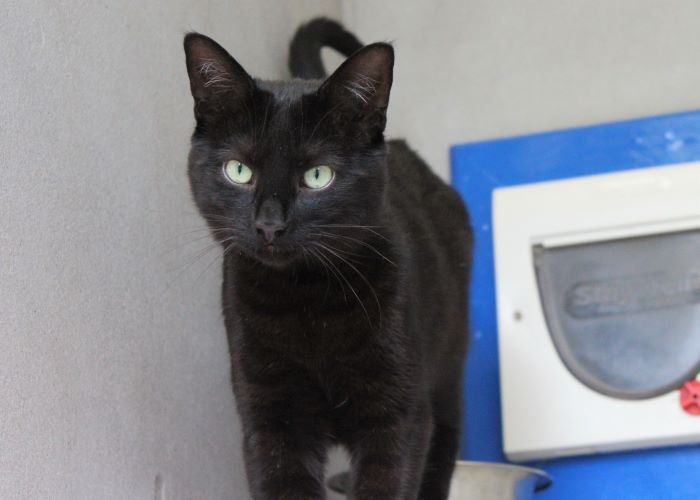THE RSPCA has launched its annual Adoptober campaign encouraging prospective pet owners to consider giving a rescued animal a new home as new figures raise concerns that more animals are being relinquished to charities at a time when rehoming has slowed.
The animal welfare charity – which operates 14 national rehoming centres across England and Wales, while supporting a network of branches with an additional 45 animal shelters – has released new figures that show nationally (across England and Wales) rehoming has dropped 8% while animal intake is up 8.4% year-on-year.
The RSPCA’s annual Adoptober rehoming drive has kicked off today and will run throughout October, promoting adoption and highlighting the many animals the charity has waiting to find their perfect match.
The charity fears that the cost of living crisis means more animals are coming into its care while less people are considering taking on a new pet.
Releasing new figures today (4 October, World Animal Day), the RSPCA has highlighted a potential animal rescue crisis as more animals come into care, stay in rescue centres for longer, with less people coming forward to adopt.
In 2021, the RSPCA’s network of centres and branches rehomed 26,945 animals; an 8% drop compared to the previous year when 29,358 animals were rehomed, and a huge 31% drop from 2019 (39,178) despite the Covid pandemic affecting the way in which charities across the nation could rehome.
The number of dogs rehomed by the charity also fell 6% from 4,877 in 2020 to 4,567 in 2021; while cats dropped 12% from 17,868 in 2020 to 15,579 in 2021.
In Wales, the total number of animals rehomed slipped 15% from 1,162 in 2020 to 986 in 2021. The number of cats rehomed fell 25% from 759 in 2020 to 571 in 2021; and the number of rabbits dropped 40% from 88 to 53. Dogs bucked the trend and the number rehomed in 2021 rose from 239 to 241, while the number of other pets – like small furries, birds etc – also rose by 59% from 76 to 121.
Across England and Wales, the average stay for an animal (the number of days they spend in RSPCA care from being ready to rehome to leaving for their new home) also increased for dogs by 9.4% – from 85 days in 2020 to 93 days in 2021 – and for rabbits – from 104 in 2020 to 117 in 2021, an increase of 12.5%. Cats length of stay remained the same at 67 days.
Pet welfare expert Dr Samantha Gaines said: “It’s really concerning to see that animals are staying in our care for longer and that less are being rehomed year-on-year. Unfortunately, we believe we’re really starting to see the devastating impact of the Covid-19 pandemic and the cost of living crisis.
“Many of the animals – particularly dogs – who are coming into our care have behavioural challenges which could be linked to how they were bred as well as lockdown limiting the amount of training, socialising and outside world experience they had.
“We’re also beginning to see more animals coming into our care because their owners simply couldn’t afford to care for them any more; or, in the most extreme cases, having been neglected or abandoned due to the rising cost of pet care.
“Sadly, this is coming at the same time that potential pet owners are deciding now is not the best time to take on an animal due to the soaring cost of living, and feeling they cannot financially commit to adding a pet to their family at such a worrying time.
“For those who are able to bring a pet into their home, we are urging them to really consider adopting rather than buying. Many of our animals will already be neutered, vaccinated and treated for fleas and worms – making it much more cost-effective – and we will work them to make sure they find their perfect match.”
In 2021, the RSPCA saw more dogs, rabbits and other pets (including small furries, pet birds, farm animals and exotics) coming into its care than in 2020. Intake for cats and horses fell by 1.7% and 18.1%, respectively.
Last year, the charity rescued:
- 7,412 dogs – 11.9% more than the 6,624 in 2020;
- 7.1% more rabbits (2,731 compared to 2,549);
- 6% more other pets (5,900 compared to 5,566).
The RSPCA’s Animal Kindness Index – released earlier this year – highlighted the impact the cost of living crisis is having on pet owners. The survey found that 68% of pet owners were concerned about the increasing cost of pet care while 19% were worried about being able to afford to feed their pets.
Figures released by the charity in August revealed that its cruelty line was receiving more than 100 reports a day of animals being abandoned throughout 2021; and the concern is that the cost of living crisis could lead to this riding even higher.


















